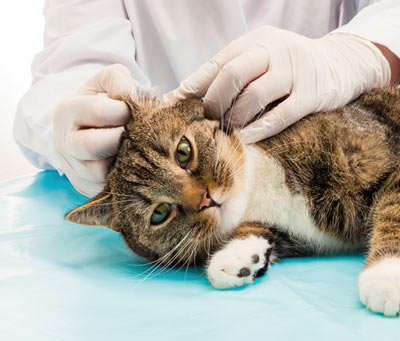Ear Mites in Cats

Ear mites are parasites that take up residence in a cat's ear canal, feeding on wax and skin there, laying eggs, hatching, and so on and so on.
What Are the Signs of Ear Mites in Cats?
Ear mites are itchy and painful for cats, so the signs they show when they are infected have to do with those feelings plus the debris that the mites create in the ears. You might notice these signs if your cat has ear mites:
- Excessive debris in the ears that usually resembles coffee grounds.
- Extreme scratching of the ears with the back feet or rubbing them on items in the home.
- Shaking the head violently. Cats may develop an ear hematoma, which is blood inside of their ear flap, from shaking their heads. This will appear as a swollen ear flap.
-
Scabs, hair loss, and redness around the ears and sometimes on the rear feet and head.
How Do Cats Get Ear Mites?
The mite that most often affects cats' ears is Otodectes cynotis. These tiny mites can barely be seen by the naked eye; they are much easier to see under a microscope. They invade the lining of a cat's ear canal, where they go through their entire life cycle, feeding on ear wax and skin cells.
Cats get ear mites from casual contact with other cats that are infected by them. They are especially common in kittens and cats that go outside.
Can My Dog Get Ear Mites from My Cat?
Your dog can get ear mites from your cat. Dogs are affected by ear mites much more rarely than cats, though, especially if they don't live with cats that go outside.
In fact, many people whose dogs begin to scratch their ears automatically assume ear mites are involved and begin treating with an over-the-counter ear mite medication. Most of the time, the dog has an ear infection, which the medications don't help, and the problem becomes worse.
People almost never have health problems associated with catching ear mites from their pets. However, sometimes a person will develop a mild rash on their skin if they are exposed to ear mites on their cat's fur or ears.
How Are Ear Mites in Cats Treated?
Ear mites can be treated a few different ways:
- Over-the-counter medications are available for treating feline ear mites. However, these medications must be used for at least 30 days in a row, and that can be difficult to accomplish with some cats. We recommend always checking with your veterinarian before using any over-the-counter medication on your cat because some of them don't work well or can even be dangerous for cats. Also, some ear products are dangerous to use if a cat's eardrum is ruptured, so your cat should be thoroughly examined by a veterinarian before using any ear mite treatment.
-
Tresaderm is a prescription topical ear medication that resolves ear mites in about 10 days. It can also help treat the inflammation and any secondary infection that might result from ear mite infestation. Sometimes, Tresaderm treatment needs to be repeated for a second 10 day period.
- Ivermectin injections can be used to treat ear mites in cats, but it isn't done very often because the injections need to be repeated, often several times, and there are potential negative side effects. This treatment is off-label, so it isn't approved as a way of using ivermectin by the FDA.
- Spot-on treatments have become the most common and easiest way to treat feline ear mite infestations. There are several of these prescription products available for cats for this use, including Revolution and Acarexx. They are applied to the skin between the cat's shoulder blades, and one treatment usually gets rid of the ear mites. The cat's ears should still be cleaned of debris, and secondary inflammation and infection may need to be treated separately.
You May Also Like These Articles:
Amazing Cat Facts to Know and Share
Cat Myths: Separating Fact from Fiction
How to Tell Cats You Love Them





